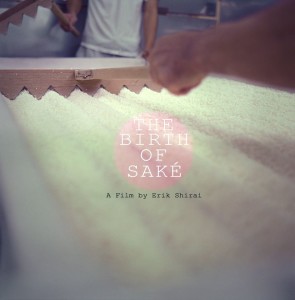 One of the many documentaries playing at this year’s Tribeca Film Festival is Erik Shirai’s The Birth of Sake, a film that I, and probably others interested in the art of sake brewing, was very much looking forward to seeing.
One of the many documentaries playing at this year’s Tribeca Film Festival is Erik Shirai’s The Birth of Sake, a film that I, and probably others interested in the art of sake brewing, was very much looking forward to seeing.
Shot over the course of a year, Shirai’s film takes us on a tour of the Tedorigawa Brewery, providing us with an inside look at one of the few remaining sake breweries still using the traditional method of brewing sake, doing everything by hand. A majority of the film focuses on two of the brewery’s employees, the head brewmaster, known as a Toji, and the son of the company’s president and aspiring Toji, Yachan. The film gives us an in-depth look at the brewing process, what it’s like working at the brewery, and what each individual does when they’re not at the brewery.
One of the first actual facts we learn about brewing sake in the traditional way is that it requires a lot of hands and a ton of dedication. All employees live on site for six months straight with very few, if any, days off. It’s a communal style of living and requires everyone’s full attention and commitment as they want to make sure they brew the best sake possible. This can obviously be troublesome for those employees that have families so making sure the employees are happy is very important. You can only imagine what it would be like to live with a bunch of men for a long period of time.
Shirai’s film does two things very well: It hypnotizes you with its beautiful cinematography and it clearly explains and shows you how sake is made and consumed. Shirai does an incredible job of shooting this film. Rather than show talking heads during the interview portions, he uses wonderful imagery from the Japanese landscape around the brewery to slow motion shots of the sake brewing process itself to fill those gaps before he cuts to live-action brewing, group chats or business being conducted. It’s a very Japanese approach as the cinematography can try your patience, making you feel as if you’re experiencing the long brewing process with the brewers over the year the film was shot. I think the second aspect is pretty self-explanatory.
One of the most interesting aspects to me was watching Yachan while he was away from the brewery. When all the employees go home to be with their family and do whatever else they do when brewing is finished, Yachan heads out to promote and sell the sake. He understands that sake consumption has decreased drastically but that tastes are also shifting. While older folks prefer stronger, maybe even bitter sake, women and the younger generation prefer a different, fresher taste. Retailers are aware of this and the way the sake is actually produced isn’t as important to them as it once was. This puts Yachan in an interesting position as he sells his product and does research to see how he can make sure his family’s 141 year old business survive when he takes over as President in 2020.
Other than the aspects mentioned above and a few really funny scenes, there is one major flaw with the film, it’s incredibly slow. I understand that the film is very Japanese and wants you to be patient, experiencing time the way the employees must experience it, but this movie felt like it was 20 minutes too long. As mentioned above, there are a handful of extended scenes where it’s just scenic shots of Japan and the brewery with no substance added to it. This is ok once or twice and for 15-30 seconds or so at a time, but there were many moments like this, long periods of time with no dialogue and a very beautiful zen-like score, but since the scenes are long it started to put a few people to sleep. Even I started to struggle with keeping my eyes open and I was really interested in the subject (I also love Japan). This is the biggest flaw of the film and why it’s hard for me to strongly recommend it to people at the festival.
I want to say that I really liked The Birth of Sake, but the meditative approach to the film really hinders its ability to let the sake knowledge sink in since you’re trying so hard not to pass out. The visuals and music were lovely but the film is just too long for the amount of substance it actually has. Unless you’re dying to know how traditional sake is brewed or are looking for a movie where you’ll be able to take a fantastic nap, then I would recommend The Birth of Sake, otherwise watch with caution and hope your curiosity can keep you awake since there really are some great moments.
















Recent Comments